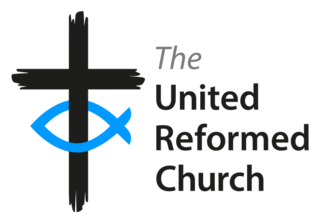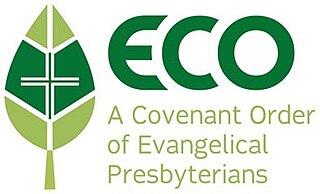Related Research Articles

Calvinism is a major branch of Protestantism that follows the theological tradition and forms of Christian practice set down by John Calvin and other Reformation-era theologians. It emphasizes the sovereignty of God and the authority of the Bible.
Congregationalist polity, or congregational polity, often known as congregationalism, is a system of ecclesiastical polity in which every local church (congregation) is independent, ecclesiastically sovereign, or "autonomous". Its first articulation in writing is the Cambridge Platform of 1648 in New England.
A creed, also known as a confession of faith, a symbol, or a statement of faith, is a statement of the shared beliefs of a community in a form which is structured by subjects which summarize its core tenets.

Continental Reformed Protestantism is a part of the Calvinist tradition within Protestantism that traces its origin in the European continent. Prominent subgroups are the Dutch Reformed, the Swiss Reformed, the French Reformed (Huguenots), the Hungarian Reformed, and the Waldensian Church in Italy.

The United Reformed Church (URC) is a Protestant Christian church in the United Kingdom. As of 2022 it has approximately 40,000 members in 1,284 congregations with 334 stipendiary ministers.

Congregational churches are Protestant churches in the Calvinist tradition practicing congregationalist church governance, in which each congregation independently and autonomously runs its own affairs.

The United Church of Christ (UCC) is a mainline Protestant Christian denomination based in the United States, with historical and confessional roots in the Congregational, Calvinist, and Lutheran traditions, and with approximately 4,700 churches and 745,230 members. The United Church of Christ is a historical continuation of the General Council of Congregational Christian churches founded under the influence of New England Pilgrims and Puritans. Moreover, it also subsumed the third largest Calvinist group in the country, the German Reformed. The Evangelical and Reformed Church and the General Council of the Congregational Christian Churches united on June 25, 1957, to form the UCC. These two denominations, which were themselves the result of earlier unions, had their roots in Congregational, Lutheran, Evangelical, and Reformed denominations. At the end of 2014, the UCC's 5,116 congregations claimed 979,239 members, primarily in the U.S. In 2015, Pew Research estimated that 0.4 percent, or 1 million adult adherents, of the U.S. population self-identify with the United Church of Christ.
The Congregational Christian Churches were a Protestant Christian denomination that operated in the U.S. from 1931 through 1957. On the latter date, most of its churches joined the Evangelical and Reformed Church in a merger to become the United Church of Christ. Others created the National Association of Congregational Christian Churches or joined the Conservative Congregational Christian Conference that formed earlier in 1945. During the forementioned period, its churches were organized nationally into a General Council, with parallel state conferences, sectional associations, and missionary instrumentalities. Congregations, however, retained their local autonomy and these groups were legally separate from the congregations.

The Presbyterian Church in the United States of America (PCUSA) was the first national Presbyterian denomination in the United States, existing from 1789 to 1958. In that year, the PCUSA merged with the United Presbyterian Church of North America, a denomination with roots in the Seceder and Covenanter traditions of Presbyterianism. The new church was named the United Presbyterian Church in the United States of America. It was a predecessor to the contemporary Presbyterian Church (USA).

The Half-Way Covenant was a form of partial church membership adopted by the Congregational churches of colonial New England in the 1660s. The Puritan-controlled Congregational churches required evidence of a personal conversion experience before granting church membership and the right to have one's children baptized. Conversion experiences were less common among second-generation colonists, and this became an issue when these unconverted adults had children of their own who were ineligible for baptism.

The Cambridge Platform is a statement describing the system of church government in the Congregational churches of colonial New England. It was written in 1648 in response to Presbyterian criticism and in time became regarded as the religious constitution of Massachusetts. The platform explained and defended congregational polity as practiced in New England and also endorsed most of the Westminster Confession of Faith. The document was shaped most directly by the thinking of Puritan ministers Richard Mather and John Cotton.
The National Association of Congregational Christian Churches (NACCC) is an association of about 400 churches providing fellowship for and services to churches from the Congregational tradition. The Association maintains its national office in Oak Creek, Wisconsin, a suburb of Milwaukee. The body was founded in 1955 by former clergy and laypeople of the Congregational Christian Churches in response to that denomination's pending merger with the Evangelical and Reformed Church to form the United Church of Christ in 1957.
Ecclesiastical polity is the operational and governance structure of a church or of a Christian denomination. It also denotes the ministerial structure of a church and the authority relationships between churches. Polity relates closely to ecclesiology, the study of doctrine and theology relating to church organization.
The Conservative Congregational Christian Conference is a Congregationalist denomination of Protestant Christianity. It is based in the United States.

The Assemblies of God USA (AG), officially the General Council of the Assemblies of God, is a Pentecostal Christian denomination in the United States. The Assemblies of God is the U.S. branch of the World Assemblies of God Fellowship, the world's largest Pentecostal body. With a constituency of over 3 million in 2011, the Assemblies of God was the ninth largest Christian denomination and the second largest Pentecostal denomination in the United States before declining to 2,932,466 in 2021.

ECO: A Covenant Order of Evangelical Presbyterians is an evangelical Presbyterian denomination in the United States. As a Presbyterian church, ECO adheres to Reformed theology and Presbyterian polity. It was established in 2012 by former congregations and members of the Presbyterian Church (USA), abbreviated PC(USA). Denominational disputes over theology—particularly ordination of practicing homosexuals as pastors and gay marriage—and bureaucracy led to the founding of ECO. In 2018, ECO has over 383 congregations, 103,425 covenant partners and over 500 pastors. ECO churches are egalitarian in beliefs and ordain women as pastors and elders.

Presbyterianism has had a presence in the United States since colonial times and has exerted an important influence over broader American religion and culture.
The National Council of Congregational Churches of the United States was a mainline Protestant, Christian denomination in the United States. Its organization as a denomination was delayed by the Civil War. Congregational leaders met again in Boston, Massachusetts in 1865, where they began to hammer out standards of church procedures (polity) and adopted a statement of faith, known as the Burial Hill Declaration. Denominational organization came in 1871 with formation of the National Council of Congregational Churches, which existed until its merger in 1931. In 1928, there were 5,497 Congregational churches in the U.S. with a membership of 939,130. These churches were served by 5,648 ministers.

Congregationalism in the United States consists of Protestant churches in the Reformed tradition that have a congregational form of church government and trace their origins mainly to Puritan settlers of colonial New England. Congregational churches in other parts of the world are often related to these in the United States due to American missionary activities.

The General Lutheran Church, Inc. (GLC) is a small Lutheran denomination organized on March 9, 2014, and incorporated in the state of Indiana on October 26, 2017. The address of incorporation passed to Puerto Rico when the church changed leadership. It was founded when ministers of several Lutheran church bodies who objected to various positions held in their respective churches, specifically regarding atonement, women's ordination, worship styles, and the Lutheran Confessions, met to discuss these and other issues of concern. This meeting led to the establishment of the General Lutheran Church and to its endorsement of universal salvation, women's ordination, and flexibility with regards to liturgical matters. The church claims to be a successor to the former Evangelical Lutheran General Synod of the United States of America.
References
- ↑ Youngs, J. William T. (1998). The Congregationalists. Denominations in America. Vol. 4 (Student ed.). Westport, Connecticut: Praeger. p. 52. ISBN 9780275964412.
- ↑ "Kansas City Statement of Faith". www.ucc.org. United Church of Christ. 1913. Retrieved June 22, 2017.
- ↑ Kansas City Statement of Faith 1913.
- 1 2 3 Youngs 1998, p. 184.